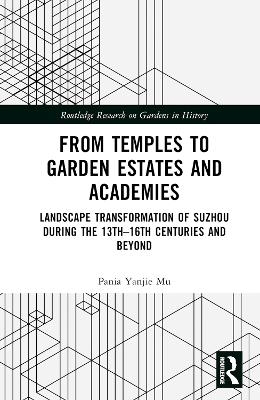
From Temples to Garden Estates and Academies
Landscape Transformation of Suzhou During the 13th–16th Centuries and Beyond
Seiten
2025
Routledge (Verlag)
978-1-032-48057-2 (ISBN)
Routledge (Verlag)
978-1-032-48057-2 (ISBN)
- Noch nicht erschienen (ca. Januar 2025)
- Versandkostenfrei innerhalb Deutschlands
- Auch auf Rechnung
- Verfügbarkeit in der Filiale vor Ort prüfen
- Artikel merken
How did the temple-scape of Suzhou transform into garden-scape during the 13th to 16th centuries? This book investigates the landscape evolution of China during the Yuan-Ming socio-political transformation and provides a previously unrepresented Buddhist and hydraulic history of Chinese gardens.
Utilizing historical GIS mapping and 3D architectural modelling, the research uncovers spatial strategies employed by monks, the gentry, and the government. It argues that by seizing hydraulic estates from Buddhists, the gentry and government rose as landed class and cultural elites, establishing the literati garden. Yuan temples featured a mound-field-river topography which reclaimed urban wetlands. In temples such as Shizi Lin, scenes were crafted as Chan gong’ans to support Buddhist practice towards enlightenment, underpinning a monastic architectural transformation in the 14th century. In the Ming dynasty, the gentry and government exploited the hydro-topography while erasing Buddhist traces by converting temples into gardens. The book forms a theoretical model of triangulating the garden practice with socio-hydro spaces and advocates a new garden history enabled by historical mapping and modelling.
This book is aimed at students and scholars of East Asian history, temples and gardens, and landscape architecture and design.
Utilizing historical GIS mapping and 3D architectural modelling, the research uncovers spatial strategies employed by monks, the gentry, and the government. It argues that by seizing hydraulic estates from Buddhists, the gentry and government rose as landed class and cultural elites, establishing the literati garden. Yuan temples featured a mound-field-river topography which reclaimed urban wetlands. In temples such as Shizi Lin, scenes were crafted as Chan gong’ans to support Buddhist practice towards enlightenment, underpinning a monastic architectural transformation in the 14th century. In the Ming dynasty, the gentry and government exploited the hydro-topography while erasing Buddhist traces by converting temples into gardens. The book forms a theoretical model of triangulating the garden practice with socio-hydro spaces and advocates a new garden history enabled by historical mapping and modelling.
This book is aimed at students and scholars of East Asian history, temples and gardens, and landscape architecture and design.
Pania Yanjie Mu is a Postdoctoral Research Associate at the Institute of East Asian Art History, Heidelberg University, Germany, and co-founder of P. M. Architects. She received her PhD from Faculty of Architecture, The University of Hong Kong.
Introduction 1. Garden Estates: Transforming Urban Hydrology 2. Constructing the Temple-scape 3. Converting Temples into Literati Gardens 4. Converting Temples into Confucian Institutions 5. From Buddhist to Gentry Society. Conclusion: A New Garden History: Hydro-Social Transformation Illuminated by 3D Modelling and GIS Mapping
| Erscheint lt. Verlag | 28.1.2025 |
|---|---|
| Reihe/Serie | Routledge Research on Gardens in History |
| Zusatzinfo | 11 Tables, black and white; 1 Line drawings, black and white; 72 Halftones, black and white; 73 Illustrations, black and white |
| Verlagsort | London |
| Sprache | englisch |
| Maße | 152 x 229 mm |
| Themenwelt | Geisteswissenschaften ► Geschichte ► Regional- / Ländergeschichte |
| Geschichte ► Teilgebiete der Geschichte ► Kulturgeschichte | |
| Geschichte ► Teilgebiete der Geschichte ► Religionsgeschichte | |
| ISBN-10 | 1-032-48057-2 / 1032480572 |
| ISBN-13 | 978-1-032-48057-2 / 9781032480572 |
| Zustand | Neuware |
| Informationen gemäß Produktsicherheitsverordnung (GPSR) | |
| Haben Sie eine Frage zum Produkt? |
Mehr entdecken
aus dem Bereich
aus dem Bereich
der stille Abschied vom bäuerlichen Leben in Deutschland
Buch | Hardcover (2023)
C.H.Beck (Verlag)
23,00 €
Die Revolution des Gemeinen Mannes
Buch | Softcover (2024)
C.H.Beck (Verlag)
12,00 €


